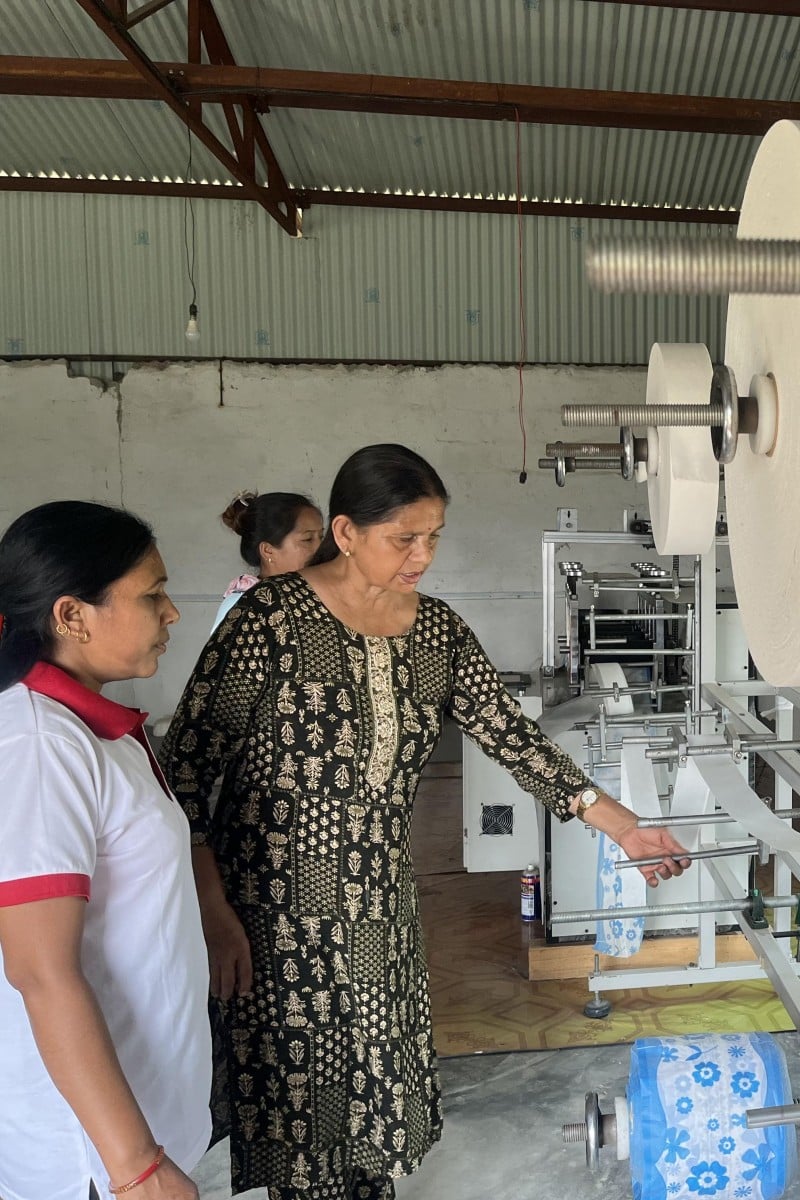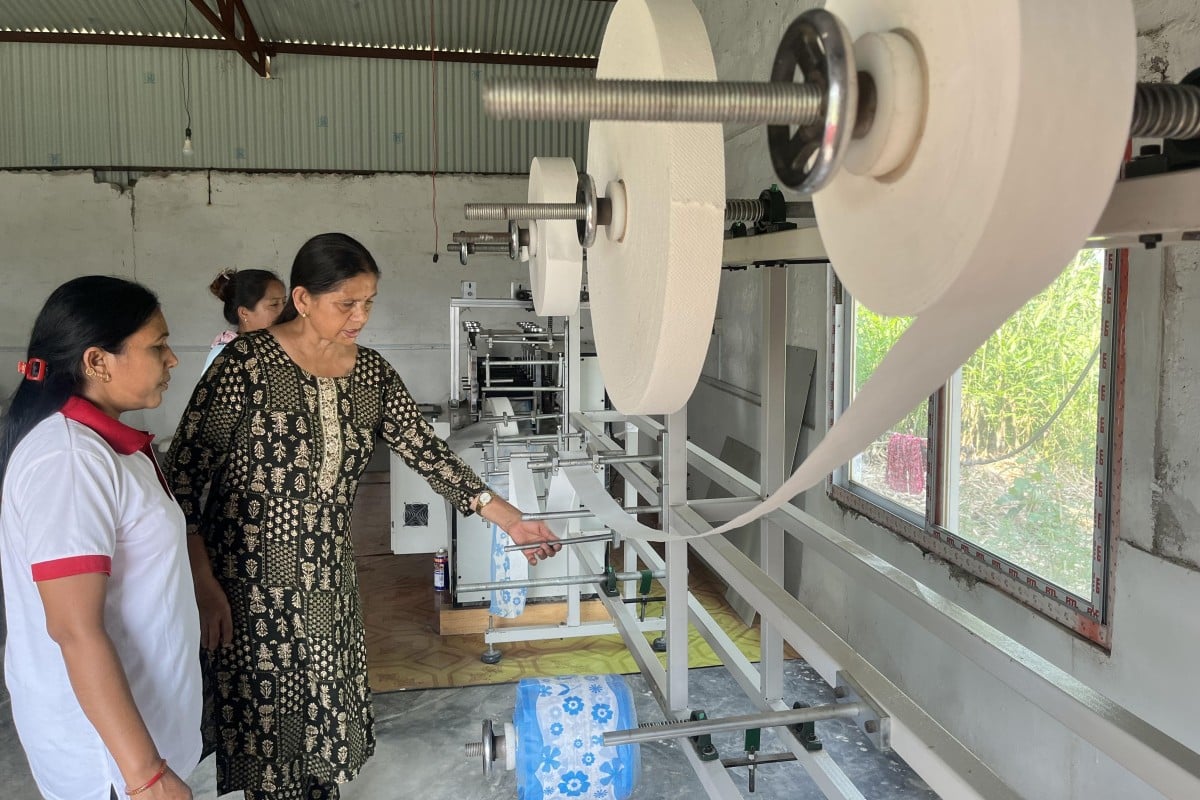
A women-run factory in the South Asian country is educating the public about biodegradable menstrual pads
 Sabitri Bhandari, coordinator of the Miteri Jaibik Pad Udhyog factory in Chitwan, inspects a pad-making machine. Photo: Bibek Bhandari
Sabitri Bhandari, coordinator of the Miteri Jaibik Pad Udhyog factory in Chitwan, inspects a pad-making machine. Photo: Bibek BhandariIn a quiet corner of southern Nepal, a small women-run factory is driving a growing movement to replace conventional menstrual pads with biodegradable alternatives.
It’s part of a grass roots effort to protect women’s health and the environment while dismantling entrenched taboos around menstruation.
The Miteri Jaibik Pad Udhyog (Miteri eco-friendly pad factory) in Gunjanagar, Chitwan district, has been manufacturing single-use biodegradable pads and reusable cloth pads since 2017, dispelling perceptions that such products are either costly or unhygienic.
The pads, called Miteri – or “chosen kinship” in Nepali – offer women healthier choices while raising awareness about the high environmental footprint of disposable non-biodegradable pads and encouraging what some advocates call “green menstruation”.
City University student Sakshi Vasudev is on a mission to make periods eco-friendly
“I grew up seeing women use unhygienic cloths during menstruation,” said Radha Paudel, a nurse turned advocate for dignified menstruation, who started the pad factory along with Chitwan-based Active Women’s Forum for Justice.
“I always wanted to start a social enterprise that upheld a menstruator’s dignity, that is good for the planet and also affordable.”
That philosophy is practised inside a tin-roof factory, where a single machine produces about 8,000 pads daily. They are made using pinewood pulp sheet and cotton, with bioplastic packaging, ensuring the entire product is biodegradable.
Calls to promote eco-friendly pads in Nepal come amid growing concerns globally over the safe disposal of menstrual products. Several studies show that tampons and pads are made up of up to 90 per cent plastic and usually take 500 to 800 years to decompose.
In Nepal, an estimated 140 million pads are used annually, adding to a significant menstrual waste load in the country, according to research by Kathmandu-based Health Environment and Climate Action Foundation, or HECAF360.
Mahesh Nakarmi, founding chairman and executive director of HECAF360, said his organisation tested 47 brands of menstrual pads and tampons available in Nepal in 2018.
They found that most non-biodegradable pads contained harmful chemicals such as super absorbent polymers and bleaches, while some commercially available fabrics contained chemical dyes.
“Our worm composting showed that pads made from cotton cloth and dyed with natural plant-based dyes, and single-use products made from plant-based fibres such as pine and banana, were the only ones fully consumed by worms within six months,” he said.
“That’s good for the environment and also protects women from exposure to harmful chemicals found in non-biodegradable available pads – chemicals that global research has linked to serious health issues, including cancer.”
Your Voice: how to improve the waste reduction scheme, saving endangered sea turtles (long letters)
The Nepali government introduced a national programme to distribute free pads across schools in 2020, aimed at ensuring menstrual health and curbing absenteeism of girl students during their monthly cycle.
Nakarmi said their research found that, without national guidelines for menstrual waste management, most pads were either flushed, burned or ended up in landfills.
He added that while the government’s pad distribution programme in schools was well-intentioned, it must also consider the environmental impact and the long-term health of girls, which could be at risk if these issues were not addressed on time.
“We’re lobbying for a transition from single-use menstrual pads to reusable biodegradable alternatives and have held discussions with ministries and policymakers,” Nakarmi said. “But very few are paying attention. Currently, there is an insufficient supply of compostable, safe, single-use and reusable biodegradable pads in the market.”
Few local governments have tried promoting eco-friendly pads, including the Madi municipality, some 40km from Gunjanagar.
Madi, which brands itself as an “eco village”, donated 500,000 rupees (US$3,685) to Miteri in 2021 and also bought the pads for its school distribution programme around the same time. However, the initiative later ended due to procurement changes favouring bulk orders, said municipality chief Shiva Prasad Subedi.
Inspired by Miteri’s initiative, other small enterprises are also taking the lead. Sparsa, another women-led social business, is introducing compostable pads made of banana fibre in Chitwan, utilising the region’s agricultural waste and generating employment.
Anjana Kumal, a 32-year-old employee at Miteri’s facility, said her work had enabled her to speak out against a taboo topic. She even set an example by celebrating her 11-year-old daughter’s first menstruation last year while working at the factory instead of confining her as would have been the case under local tradition.
“Miteri provides not just entrepreneurial skills to marginalised communities, but turns women from victims and survivors of menstrual discrimination to community leaders,” said Paudel, also the founder of Global South Coalition for Dignified Menstruation.
Help! I started my period. How do I talk to my mum about it?
Menstrual practices are deeply rooted in religion and culture in Nepal, with women referred to as “untouchable” during their monthly cycle. They are barred from entering kitchens, taking part in religious rituals and in extreme cases banished to menstrual huts, where women have been raped or died of snakebites and suffocation.
Nepal criminalised the practice of banishing women to huts in 2017, with a three-month imprisonment or a 3,000 rupees (US$22) fine for violating the law. However, the practice has not been entirely eradicated.